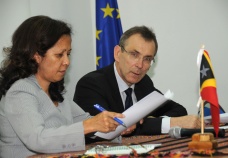Commissioner Piebalgs launched programmes worth €39 million to support Timor-Leste on its way to stable democracy and sustainable development

Timor-Leste, while still a fragile state, has made impressive progress since its independence in 2002, emerging from a violent past and overcome dramatic challenges. European Commissioner for Development, Andris Piebalgs visited Timor-Leste from 7 until 10 March to confirm EU support to the country and the determination to assist Timor-Leste in climbing up the development ladder. He signed a package of four strategic programmes for a total amount of €39 million to support democratic governance, development of the rural areas, and the role of civil society. The Commissioner also met with President and Nobel Peace Prize winner Jose Ramos-Horta.
Overall, Timor-Leste has achieved many successes: establish good relations with its regional neighbours, strengthen its young democracy, manage its oil/gas revenues prudently and achieve important progress namely as regards poverty reduction (by 9% in only 2 years). Although it is still a fragile state faced with several difficulties such as high poverty levels (40%), food insecurity and youth unemployment.
Signing of Financing Agreements
On 8 March, Commissioner Piebalgs together with Timor-Leste's Minister of Finance Emilia Pires, signed four so-called Financing Agreements, amounting to €39 million. These strategic programmes are:
1) Support to rural development for €23 million - including support – mainly capacity-building - for rural extension services and the rehabilitation of rural roads.
2) Support to democratic governance for €10.5 million - the project aims to provide crucial support to the vital institutions of Parliament and the judiciary, as well as empowering the local media.
3) Support to non-state actors for €4 million – through a partnership between international and local NGOs, this project is aimed at issues of good governance and capacity-building at rural communities' level, as well as issues of civic education.
4) Technical Cooperation Facility for €1.5 million - this instrument aims to support capacity-building through training, participation in regional and international events.
Background:
The Republic of Timor-Leste is one of the youngest countries in the world: It gained independence in 2002 after a 24-year period of conflict under Indonesian rule. Timor ranks 120th out of 169 countries (Human Development Report 2010) and now belongs to the "medium development" category, thus having moved up from 162nd ("low human development") out of 182 countries in 2009. The EU is one of the main donors in Timor-Leste, having made a significant contribution to the development of this country since 1999. The focus of funding (10th EDF) is on rural development, health, institutional capacity building and support to non-state actors, but also – via the Instrument for Stability – on the reform of the security sector and the reduction of factors feeding instability. Other interventions cover the areas of food security, water and sanitation, energy and support to civil society. €328 million have been provided to Timor-Leste since 1999. The European Union as a whole, including Member States and the Commission, has contributed close to half of the total global assistance to Timor-Leste since 1999 (around €900 million).















